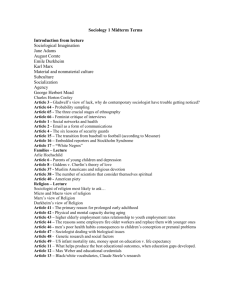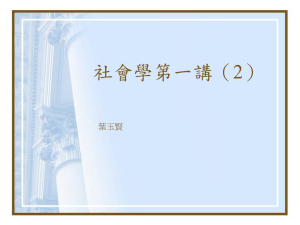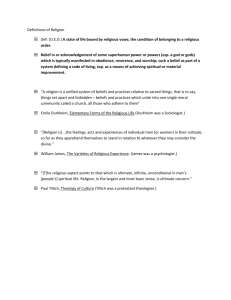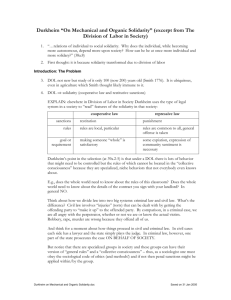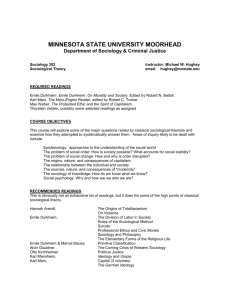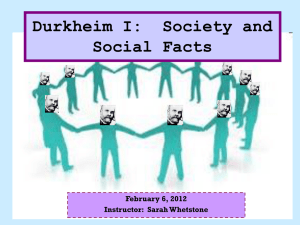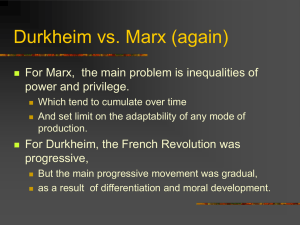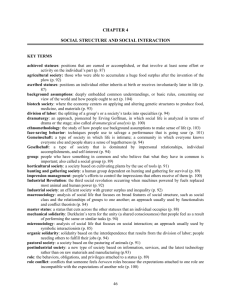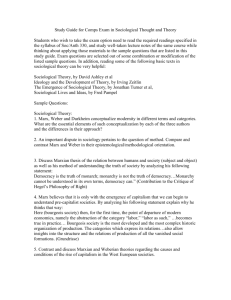Durkheim on Solidarity
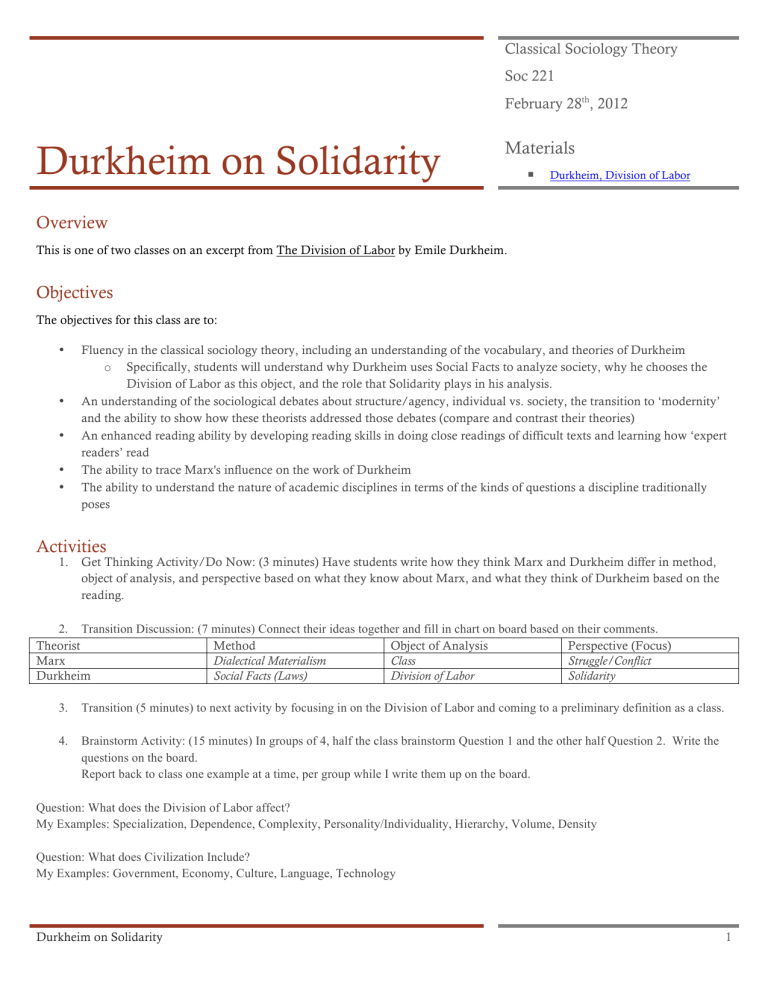
Classical Sociology Theory
Soc 221
February 28
th
, 2012
Durkheim on Solidarity
Materials
¡ Durkheim, Division of Labor
Overview
This is one of two classes on an excerpt from The Division of Labor by Emile Durkheim.
Objectives
The objectives for this class are to:
• Fluency in the classical sociology theory, including an understanding of the vocabulary, and theories of Durkheim o Specifically, students will understand why Durkheim uses Social Facts to analyze society, why he chooses the
Division of Labor as this object, and the role that Solidarity plays in his analysis.
•
An understanding of the sociological debates about structure/agency, individual vs. society, the transition to ‘modernity’ and the ability to show how these theorists addressed those debates (compare and contrast their theories)
•
An enhanced reading ability by developing reading skills in doing close readings of difficult texts and learning how ‘expert readers’ read
•
The ability to trace Marx's influence on the work of Durkheim
•
The ability to understand the nature of academic disciplines in terms of the kinds of questions a discipline traditionally poses
Activities
1.
Get Thinking Activity/Do Now: (3 minutes) Have students write how they think Marx and Durkheim differ in method, object of analysis, and perspective based on what they know about Marx, and what they think of Durkheim based on the reading.
2.
Transition Discussion: (7 minutes) Connect their ideas together and fill in chart on board based on their comments.
Theorist
Marx
Durkheim
Method
Dialectical Materialism
Social Facts (Laws)
Object of Analysis
Class
Division of Labor
Perspective (Focus)
Struggle/Conflict
Solidarity
3.
Transition (5 minutes) to next activity by focusing in on the Division of Labor and coming to a preliminary definition as a class.
4.
Brainstorm Activity: (15 minutes) In groups of 4, half the class brainstorm Question 1 and the other half Question 2. Write the questions on the board.
Report back to class one example at a time, per group while I write them up on the board.
Question: What does the Division of Labor affect?
My Examples: Specialization, Dependence, Complexity, Personality/Individuality, Hierarchy, Volume, Density
Question: What does Civilization Include?
My Examples: Government, Economy, Culture, Language, Technology
Durkheim on Solidarity 1
5.
Transition: (5 minutes) Using what is on the board, explain what changes when a society’s Division of Labor changes.
Have students say what kind of a Division of Labor it takes to have a ‘Civilization’ based on what they say it includes.
Discuss if this differs from Durkheim’s analysis. Segue into discussing how unlike the other things they listed, solidarity does not increase or decrease as the Division of Labor changes, rather it changes in kind.
6.
Interactive Lecture on Solidarity with Close Reading: (20 minutes)
Mechanical and Organic solidarities are not different kinds of society. Every society has both. The examples in the text are in the extreme where it seems like all of one and none of the other, but even then there is some of both. Durkheim explains them as Ideal Types (give a little preview of Weber).
Mechanical Solidarity Examples: a worm, Elvis concert with fans surrounding
Ask students if they can name characteristics. Examples: No Intermediary, Share same beliefs and tendencies, Mechanical Solidarity is inverse to level of personality, Called mechanical because inanimate, not because it’s artificial, People are not passive in mechanical, The society on a whole is individual, not the people, (p4). Mechanical doesn’t lack individuals, and it’s not oppressive necessarily, the levels of common interest are higher and individuality is lower. Mechanical Solidarity has Low division of labor, low specialization, and low diversity of positions.
Transition: We are made of two consciousness’s group and individual – mechanical and organic are degrees and can exist in same society
Organic Solidarity Examples: Modeled like an organism, brain is like the state, organs connected through nerves, veins, and each serve a purpose but needed for whole.
Ask students if they can name characteristics. Examples: Connect through intermediaries, High Division of Labor, High Specialization,
High Dependency, Complex, High Individuality. Individual is always influenced by society; the cultivation of individuality is a social production
Conclude with saying individual is produced by society, and raise issues of why a society would want to produce individuality (example: so to have access to different goods). Connect this to the idea of social production of self, rather than soul etc., and note how this is uniquely sociological.
7.
Transition (5 minutes) Have students write down personal reflection on how they feel about individuality and whether they think that is something that can be measured as a scientific object. Do not collect, this is just for them to help develop their own thoughts.
8.
Discussion of Social Facts and Comparison to Marx: (10 minutes)
First state that Social Facts are empiricist, positivist, objective facts to observe and prompt discussion of those terms to make sure everyone is clear. Mention Durkheim’s connection to scientific thinking (the Organism, Equilibrium, Homeostasis, Balance, and Natural
Laws (p3)) and remind them Marx’s labor theory of value is based in a scientific thinking too (physics of energy transfer).
Prompt discussion with questioning the idea of equilibrium and if the social has same laws as nature.
Have a student facilitate discussion, another student be the time-keeper, and a third student ‘take stack’ of students who want to talk.
9.
Wrap up: (5 minutes)
Ask if there are any questions and for students to summarize mechanical and organic solidarity in a sentence or two.
Mention how this will continue in next class: How Marx and Durkheim see problems in the system differently—treat the cause versus treating the symptoms. Also how they see history differently, and how the transition to modernity took place.
Durkheim on Solidarity 2
